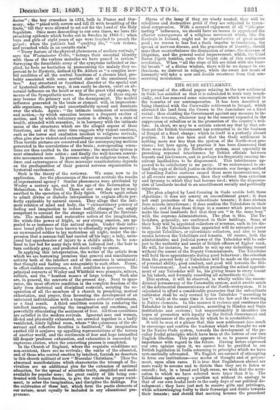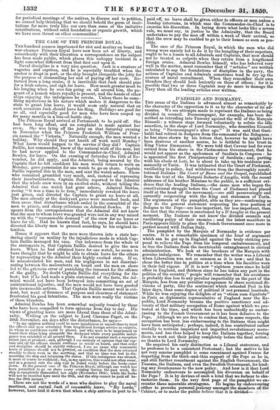THE OUDE SETTLEMENT.
THE perusal of the official papers relating to the new settlement in Oude has satisfied us that it is calculated to work very benefi- cially, and has removed some misconceptions which we noticed in the remarks of our contemporaries. It has been described as being identical with the Cornwallis settlement in Bengal, which alienated the land from the Crown to the Zemindars on a fixed rental ; thus shutting the Government against any measure to in- crease the revenue whatever may be the amount expended in the suppression of rebellion or in the promotion of the country's wel- fare. In short, we may to a certain extent say that by that set- tlement the British Government has contracted to do the business of Bengal at a fixed charge ; which in itself is a perfectly absurd position. It has also been said that the Oude settlement is nothing more nor less than the system of the North-west pro- vinces; but here again, by practice it has been discovered that there were defects in the North-west system, most especially in provoking repeated interference by British officials between tenants and landowners, and in perhaps too frequently causing in- solvent landholders to be dispossessed. This interference ap- peared to be satisfactory to no party. If we endeavoured to ex- tend the cee°is of British justice on the tenants, our foreign method of handling Native customs caused them more inconvenience, or at all events more annoyance than they suffered from extortion and tyranny to which they had become used ; while the disposses- sion of landlords tended to an unsettlement socially and politically injurious.
The plan adopted by Lord Canning in Oude avoids both these objections ; it does not convey an unconditional rant; it does not omit protection of the subordinate tenants ; it does abstain from minute interference ; it does confirm the Talookdars in their talooks ; and it does these things in a manner which promises to make the local landlords feel that they are "in the same boat" with the supreme Administration. The plan is this. The Ta- lookdars, generally, are confirmed in their holdings. Some of their body will be appointed collectors of revenue, each in his dis- trict. To the Talookdars thus appointed will be entrusted power to appoint Tehsildars, or subordinate collectors, and also to hear causes between the Tehsildars and tenants. Of course, both the administrative and judicial power of the Talookdar will be subL ject to the authority and assent of British officers of higher rank. He will, for instance, be unable to sell up any defaulting tenant without the assent of the Deputy Commissioners. The Talookdar will hold these appointments during good. behaviour ; the selection from the general body of Talookdars will be made on the grounds of personal ability, good conduct, and good will towards the Bri- tish Government. And a condition preceding the actual appoint- ment of any Talookdar will be, his giving leases to every tenant in his talook, and formally recording all subordinate rights.
This system, it will be observed, is wholly unlike the uncon- ditional permanency of the Cornwallis system and it avoids much of the detrimental inconveniences of the .Nortli-westsystem. It is calculated to afford a considerable guarantee that the subordinate cultivator shall be only coerced by his Talookdar "according to law"; while at the same time it leaves the law and the working to Native elements. In like manner it restores and continues the Talookdar in his natural position, according to Hindoo and Oude institutions and customs ; but unquestionably it identifies his hopes of promotion with loyalty to the British Government and the maintenance of the system by which he is reestablished. It will be seen at a glance that this new settlement does much to encourage and confirm the tendency which we thought we saw in the Native Oude system, towards the development of the pe- culiar feudal principles which have been at the bottom of our own English liberties. This point appears to us to possess peculiar importance with regard to the future. Having before expressed.
our own opinion upon it, we cannot but be gratified to see British legislation in India returning to principles which we have systematically advocated. We English are accused of attempting to force our institutions—our modes of thought and, of govern- ment, upon alien races. It is true that Englishmen abroad are more ready to assume and to dictate than they are to listen or consult ; but, in a broad and high sense, we wish that the accu- sation to which we have referred were truer than it is. The Talookdars again occupy a position not without its analogy to that of our own feudal lords in the early days of our political de- velopment; they have just met to receive gifts and privileges, while acknowledging fealty to their Sovereign and duties towards their tenants ; and should that meeting become the precedent
for periodical meetings of the natives, to discuss and to petition, we cannot help thinking that we should, behold the germ of insti- tutions far more truly like our own than some of the imitative constitutions, without solid foundation or organic growth, which we have seen thrust on other communities!



























 Previous page
Previous page